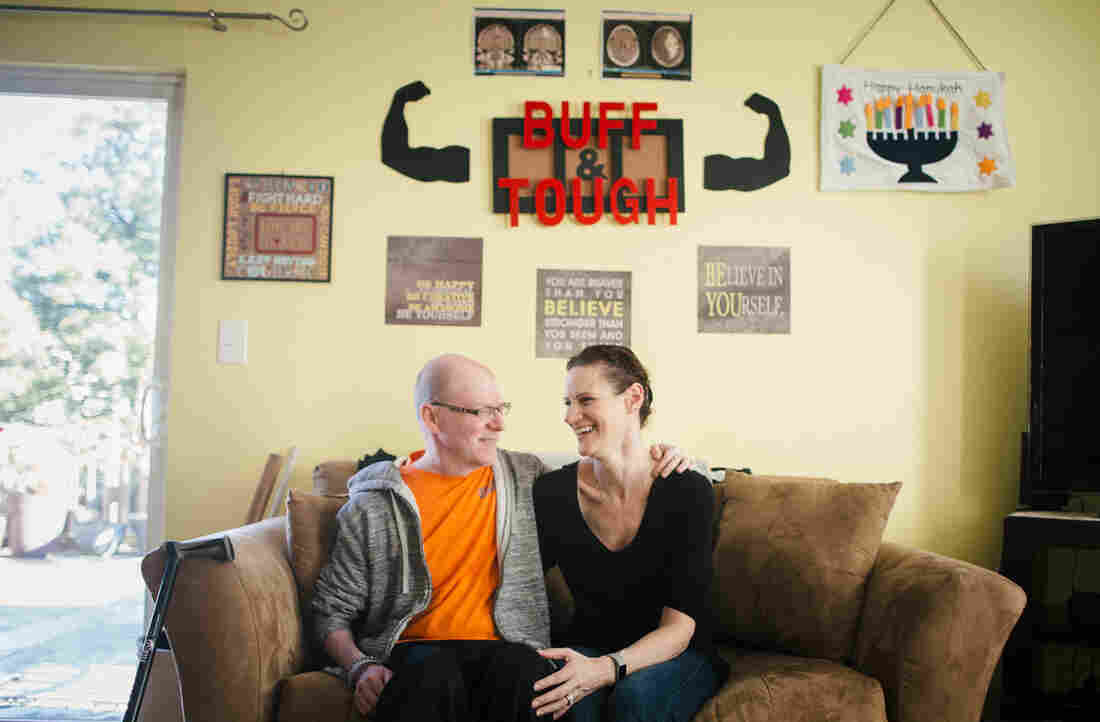LinkedIn Co-Founder On What Resolutions Silicon Valley Should Make For 2018
Between sexual harassment scandals, fake ads and stronger calls for regulation, Big Tech had a rocky year in 2017. LinkedIn Co-founder and venture capitalist Reid Hoffman talks with NPR’s Kelly McEvers about resolutions Silicon Valley should make in 2018.
KELLY MCEVERS, HOST:
And in All Tech Considered this week, we are talking about what is ahead for the tech industry in 2018.
(SOUNDBITE OF ULRICH SCHNAUSS’ “NOTHING HAPPENS IN JUNE”)
MCEVERS: In some ways, 2017 was a great year for tech companies – big growth, big profits. In other ways, it was a pretty bad year. Facebook, Twitter and Google admitted that Russian operatives used their platforms to promote fake stories during the election. There were sexual harassment scandals and criticism of the fact that white men still basically run the place.
My guest is someone who knows many of the leaders of these companies, Reid Hoffman. He is a venture capitalist. He’s the co-founder of LinkedIn. And he’s got some thoughts about how Silicon Valley can do better in 2018. Welcome to the show.
REID HOFFMAN: It’s great to be here.
MCEVERS: Up until now, tech companies have not been super great at taking responsibility for their problems. Do you think that this is the year of reckoning for tech companies?
HOFFMAN: Well, I hope that it’s actually a year of growth. I think actually part of what the tech companies are learning is they started as challengers, these kind of, you know – think of it as young teenagers with good ideas…
MCEVERS: Yeah.
HOFFMAN: …Trying to prove themselves. And now they realize I think, no, actually, in fact, we’re the incumbents. We’re the providers of the infrastructure. We have influence in the national dialogue, and we need to upgrade our play. And I think you can see that as the changing messages from them throughout the year. The way I like to look at this is – I have a funny phrase. It’s Spider-Man ethics. With power comes responsibility. With great power comes great responsibility.
And I think there’s beginning to have that recognition of, we have this responsibility, and we know that we need to act now both in conversation with society and societies and also to make sure that, like, there’s a higher level of trust and reliability and information and in a kind of – a sense of safety and security in your participation in these online networks and communities.
MCEVERS: Last year you came out with a decency pledge, and it was aimed at stopping sexual harassment in the industry. And one of the things you talked about was how much power venture capitalists have over entrepreneurs, entrepreneurs who frankly need the money (laughter), right?
HOFFMAN: Yeah.
MCEVERS: What’s being done about that? Like, how – you’re not going to undo that system, the way things work in that industry. So how do you address the problem?
HOFFMAN: Well, so the decency pledge is meant to be a – kind of a first step to just have a whole bunch of people say, look; I will not do business with people who are, you know, sexual predators, harassers, abusing their position of power in any capacity. And then everyone can make the public statement to that and that part of that public statement is then not only am I articulating a voice, but I can also be held accountable by the people who know me and see what’s going on.
I think the thing that we need to move from is – you know, last year’s decency pledge was very much of the, look; here’s a baseline that we can all do to step forward as individuals. To react to this, I think we now need to move from that reactive game to a proactive game.
MCEVERS: I just want to be really specific. Like, is that a step that’s led to any change, you know, that you can point to, any examples?
HOFFMAN: Well, I think one of the things that was really awesome is a large number of the powerful VCs in the Valley all publicly signed up to it.
MCEVERS: Yeah.
HOFFMAN: They all said, hey, I’m taking this, too. So I do think – I’ve heard from women entrepreneur friends of mine, women investor friends of mine that the atmosphere has become much more conducive to being able to speak up. And I do think that people are paying attention to – is, like, not only do we protect the victims, but we also try to fix the system. And we try to say, we have a zero tolerance around, you know, sexual harassment, sexual predators trying to abuse these power relationships. And so I think at least it’s moved the culture in the right direction. And I’ve heard good signs and conversation. I don’t have a dashboard that I could share.
MCEVERS: Recently some Apple investors urged the company to address concerns that its technology was hurting children. You know, there’s been a lot of fear out there – right? – that tech is addictive and it’s harmful or, at the very least, it’s replacing, you know, human interactions. Do you think one day we will think of tech companies the way we think of big tobacco – you know, this idea of, like, selling a dangerous product without consequences, without remorse at least?
HOFFMAN: Look; so technology always has some rough edges and downsides as well as upsides. But overall, you know, I’m glad we have it. I’m glad we’re more globally connected. I’m glad we have – even though it’s an information overload, (laughter) I’m glad we have a lot of information and can do searches and find information on things.
And you know, I tend to think that a lot of this tends to be older generations. Like, we feel, like, addicted and overwhelmed, but then the younger generations learn and adapt. So I tend to think that people are adaptive. And we can improve the technology to be net massively positive. So I think the chance that future technology is looked at as Big Tobacco is almost zero.
MCEVERS: But it puts the onus on the people who are using it – right? – to sort of adapt. And it puts a lot of, like, faith in you guys to do good. And I think that’s the hard sell right now, right?
HOFFMAN: Well, so that’s a little bit of the reason why was saying I think the broad move is towards more transparency. And either the industry will adopt ways of being transparent, which I hope and I’m pushing for. Or the government will say, well, OK, since you’re not actually being sufficiently disclosive to make sure that we don’t feel like we’re being manipulated and so forth, then we’re going to establish some rules. And the rules may limit your ability to innovate and create great new things for the world and for us, but c’est la vie.
MCEVERS: Yeah.
HOFFMAN: But I have faith that part of what I’m seeing happening, as I mentioned in the beginning, in 2017 is that the technologists and the technology companies are going, hey, no, we have responsibilities here. Let’s try to figure them out.
MCEVERS: Do you think it’s time in 2018 for, you know, more regulation?
HOFFMAN: Well, my big worry is that the most common pattern in regulation is to lock the past in slow motion against the future.
MCEVERS: Right.
HOFFMAN: And, A, I think the future’s very good for us – you know, what we can invent in precision medicine and what we can invent in anything from new communications technologies to autonomous vehicles and so forth. The second point of it is – is actually, you know, nations and groups are in competition. So if we say, well, we’re going to slow down our tech development, (laughter) you know, I don’t think other countries – China, et cetera – I don’t think they will be.
Now, that being said, if you said, OK, you know, we got to do some regulation – must do – what would it be? It would be like, well, try to demand some more transparency on the variables that most matter to you, like how much, you know, for example, election hacking is actually going on on your platform, (laughter) right?
MCEVERS: Right, yeah.
HOFFMAN: And what are you doing about it?
MCEVERS: Yeah.
HOFFMAN: And you need to be transparent about that. It’s not that we say, no election hacking. It’s – we say, you’ve got to give us good reports about what’s going on and how you’re making progress and what you’re doing about it. And I think that would be the kind of thing that I think – I hope tech companies will do more voluntarily. And I also think that if you – if I were to start doing anything because I’m so concerned about technology being part of the solution as opposed to part of the problem – that we don’t slow down our path to the solution.
MCEVERS: Reid Hoffman is a partner at the Silicon Valley venture capital firm Greylock. He also hosts the Masters of Scale podcast. Thanks for being with us.
HOFFMAN: Awesome to be here.
(SOUNDBITE OF CUT CHEMIST SONG, “THE GARDEN”)
Copyright © 2018 NPR. All rights reserved. Visit our website terms of use and permissions pages at www.npr.org for further information.
NPR transcripts are created on a rush deadline by Verb8tm, Inc., an NPR contractor, and produced using a proprietary transcription process developed with NPR. This text may not be in its final form and may be updated or revised in the future. Accuracy and availability may vary. The authoritative record of NPR’s programming is the audio record.







